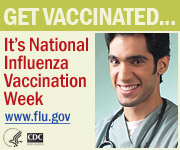National
Influenza Vaccination Week -- CDC Says H1N1 Swine Flu
Is still Circulating, Vaccine Now Widely Available
 |
 |
 |
 |
 |
 |
 |
| SUMMARY:
U.S. pubic health officials have designated
this week, January 10-16, as National
Influenza Vaccination Week. The Centers
for Disease Control and Prevention (CDC)
and the World Health Organization have recently
emphasized that the novel H1N1
influenza A virus -- commonly referred to
as "swine flu" -- is still
circulating worldwide, though the epidemic
has slowed throughout much of the U.S. and
in many global regions. Experts continue
to encourage susceptible individuals to
get the H1N1 vaccine, which is now readily
available after months of limited supplies.
|
|
 |
 |
 |
 |
 |
 |
 |
By
Liz Highleyman
 The
observance of National Influenza Vaccination Week
is intended to bring attention to influenza and its
prevention. That may hardly seems necessary this year,
given the ongoing H1N1 outbreak, but the reminder
is timely because many at-risk people still have not
yet received vaccinations for a variety of reasons.
Swine flu is no longer garnering extensive media coverage,
it has not evolved to become more deadly, some fears
persist about vaccine safety, and many people have
not been able to obtain the vaccine due to recent
shortages.
The
observance of National Influenza Vaccination Week
is intended to bring attention to influenza and its
prevention. That may hardly seems necessary this year,
given the ongoing H1N1 outbreak, but the reminder
is timely because many at-risk people still have not
yet received vaccinations for a variety of reasons.
Swine flu is no longer garnering extensive media coverage,
it has not evolved to become more deadly, some fears
persist about vaccine safety, and many people have
not been able to obtain the vaccine due to recent
shortages.
The
CDC's latest weekly flu synopsis (ending January 2,
2010) reports that doctor visits for flu-like illness
decreased during the latest reporting period. Only
1 state -- Alabama -- continued to report widespread
influenza activity, down from 4 the previous week.
In addition, 12 states reported regional flu activity;
17 states, Puerto Rico, and Washington, DC reported
local flu activity; and 19 states reported only sporadic
activity.
According
to the CDC, at least 60 million Americans have received
the H1N1 vaccine, and 136 million doses are currently
available through local health departments, private
doctors, school clinics, pharmacies, retail outlets,
and other sources. Manufacturers halted production
of the expected seasonal flu vaccine to focus on H1N1,
which has become the dominant form of influenza this
year.
"Many people are still susceptible to this virus
and would benefit from vaccination," said Anne
Schuchat, director of the CDC's National Center for
Immunization and Respiratory Diseases. "We want
to avoid complacency. We have a very good supply of
the H1N1 vaccine all around the country."
In August, the CDC
issued a list of priority groups to receive the
H1N1 vaccine. These include pregnant women, caretakers
of infants younger than 6 months old, and healthcare
personnel who have direct contact with patients. While
immunocompromised individuals are also on the list,
so far there has not
been evidence that HIV positive people per se are
more likely to experience flu-related complications
or fatalities.
Below
is the text of a proclamation from President Barack
Obama recognizing National Influenza Vaccination Week.
The
White House
Office of the Press Secretary
January 9, 2010
Presidential
Proclamation -- National Influenza Vaccination Week
Since the first United States cases were identified
in April of last year, our Nation has witnessed the
worldwide spread of the H1N1 influenza virus. To date,
tens of millions of Americans have contracted this
virus. While the vast majority of those affected have
recovered without incident, an unusually high proportion
of children and younger adults have developed serious
complications, resulting in hospitalization or even
death. We know that influenza vaccination is the best
way to protect ourselves against the flu, and my Administration
moved swiftly to respond to this threat by assisting
in the development of a vaccine, which is now widely
available and has shown to be both safe and effective.
Every American has a role to play in fighting the
H1N1 flu. Expectant mothers, children, young adults,
and all those under the age of 65 with chronic health
conditions are at high risk for H1N1 flu-related complications
and should get the vaccine as soon as possible. Those
not at high risk can protect themselves and prevent
the virus from spreading to more vulnerable members
of their families and communities by getting vaccinated
as well.
This week presents a window of opportunity for us
to prevent a possible third wave of H1N1 flu in the
United States. I strongly encourage those who have
not yet received the H1N1 flu vaccine to do so. Visit
flu.gov to find vaccination sites in communities across
our country and to stay informed. Together, we can
all fight the H1N1 flu and help protect our families,
friends, and neighbors.
Now, therefore, I, Barack Obama, President of the
United States of America, by virtue of the authority
vested in me by the Constitution and the laws of the
United States, do hereby proclaim the week of January
10-16, 2010, as National Influenza Vaccination Week.
I encourage all Americans to observe this week by
getting the H1N1 flu vaccine if they have not yet
done so, and by asking their families, friends, and
co-workers to do the same.
National
Influenza Vaccination Week website
1/12/10
Sources
B
Obama. Presidential Proclamation- National Influenza
Vaccination Week. January 9, 2010.
CDC. 2009-2010 Influenza Season Week 52 ending January
2, 2010. CDC
FluView.
CDC.
2009
H1N1 Flu: Situation Update. January 8, 2010.
S
Young. CDC: H1N1 still circulating; vaccine plentiful.
CNN (Full
story). January 7, 2010.